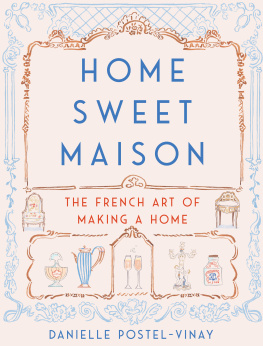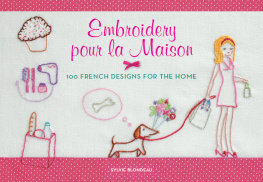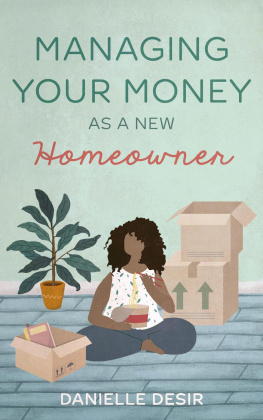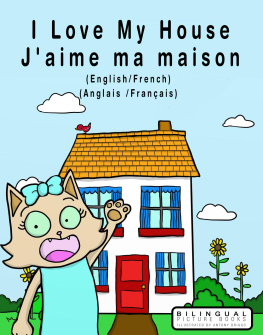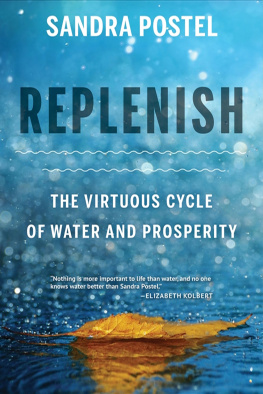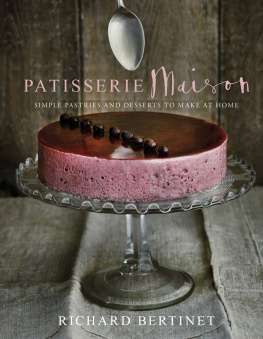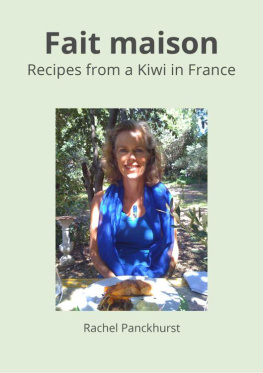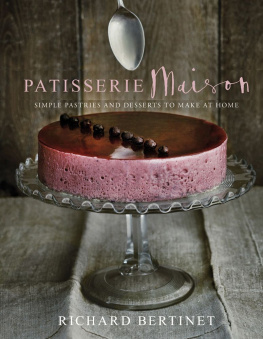Danielle Postel-Vinay - Home Sweet Maison
Here you can read online Danielle Postel-Vinay - Home Sweet Maison full text of the book (entire story) in english for free. Download pdf and epub, get meaning, cover and reviews about this ebook. year: 2018, publisher: HarperCollins, genre: Home and family. Description of the work, (preface) as well as reviews are available. Best literature library LitArk.com created for fans of good reading and offers a wide selection of genres:
Romance novel
Science fiction
Adventure
Detective
Science
History
Home and family
Prose
Art
Politics
Computer
Non-fiction
Religion
Business
Children
Humor
Choose a favorite category and find really read worthwhile books. Enjoy immersion in the world of imagination, feel the emotions of the characters or learn something new for yourself, make an fascinating discovery.
- Book:Home Sweet Maison
- Author:
- Publisher:HarperCollins
- Genre:
- Year:2018
- Rating:3 / 5
- Favourites:Add to favourites
- Your mark:
- 60
- 1
- 2
- 3
- 4
- 5
Home Sweet Maison: summary, description and annotation
We offer to read an annotation, description, summary or preface (depends on what the author of the book "Home Sweet Maison" wrote himself). If you haven't found the necessary information about the book — write in the comments, we will try to find it.
Home Sweet Maison — read online for free the complete book (whole text) full work
Below is the text of the book, divided by pages. System saving the place of the last page read, allows you to conveniently read the book "Home Sweet Maison" online for free, without having to search again every time where you left off. Put a bookmark, and you can go to the page where you finished reading at any time.
Font size:
Interval:
Bookmark:
For our home is our corner of the world... it is our first universe, a real cosmos in every sense of the word.
G ASTON B ACHELARD, T HE POETICS OF S PACE

In memory of Jacqueline Manon
(19392004)
and
For my French family and friends,
who opened their homes and shared their secrets
When I tell people that I love France, I am met with strong reactions. Im told the French are arrogant, they are elitist, and they look down their noses at anyone who is not French. I was once speaking with an American woman who told me she had never been to France but had heard that they were all snobs, so she wasnt planning to visit. The French snob. Its a stereotype weve all heard before, but that doesnt necessarily mean it is true. When I tried to explain to this woman that the French people Ive known have been extremely warm and welcoming, and that cultural differences and misperceptions were at fault, she didnt believe me. She chose to close herself off from learning more about the French because of a stereotype.
The other, equally distorted, reaction to France is the over-the-top swoon. There are those who believe that everything the French do is classy, romantic, and beautiful. And while I agree that French culture is pretty wonderful, the French are definitely not perfect. I love my French husband and his family, but they have all the human flaws of any other family. Its easy to fall victim to a gross idealization of the French. We might think the French are perfect, that their food and fashion are superior to our own, and that we will be truly happy if we move to Paris and live our lives in the midst of that old and noble civilization. But in the end, this is an illusion. We can learn a lot from the French, and we can make our lives better by understanding and adopting French culture, but France isnt a utopia.
Both extremesthe French as romantic, fashionable, cultured, oversexed gourmands who live a life of nonstop pleasure, or the French as nasty, arrogant jerks who sneer at everyoneare wrong. The French have good qualities and bad, like Americans or Italians or Japanese or Chinese or anyone else. We must look thoughtfully and analytically at these traits, so we can appreciate what is superior and ignore what is not.
In that spirit, I aim to share with you the secrets of how the French live in their homes. That doesnt involve becoming French, or even learning French and moving to France to experience French culture firsthand, although I would definitely recommend that you visit. It doesnt even mean understanding all of the (profound) differences between French culture and the way the rest of the world lives. It simply requires that you take a hard look at your home and make some systemic changes. Take what you like and reject what you dont until you create a French-influenced home that is perfect for you.
Id like to say up front that I am not a home expert. I am not a trained architect, an interior decorator, or even a full-time homemaker. The totality of my experience in the area of creating a home stems from my own lifehere in the United States and in France. Life with my French husband, and my French in-laws, has involved relearning how to do things, and that has taught me to see the beauty and effectiveness of how the French inhabit their private spaces. My hope is that by reading this book, you will recognize the benefits as well, and be inspired to incorporate the French art of making a home into your life.
T he first time I encountered a French home was in the United States.
Id been invited to dinner by a woman named Jacqueline Manon, the owner of an antique shop on the main street of my midwestern hometown. I was seventeen, a junior in high school, and had applied for a part-time job at her store, Manons, hoping to make some money so I could move into my first apartment after I graduated. I was taking my first steps toward living on my own, and fate had brought me to Jacqueline.
She didnt hire meshe was a one-woman operationbut she didnt turn me away, either. I spent many afternoons in her antique shop, where we sat in overstuffed chairs talking, drinking coffee, and smoking cigarettes, Benson & Hedges in a black enamel cigarette holder for her, and American Spirits for me. During those afternoons at Manons she taught me about her businessthe buying and selling of precious objectsas well as about her life. I learned about antique furniture and old jewelry and vintage clothes. I learned not only how one could experience culture through these old things, but also how they had the power to lead one to the future.
Jacqueline and I slowly created an unlikely friendship: I was a bookish girl in need of guidance. She was fifty-four years old, the daughter of a French mother and a German father, an ex-model turned hippie who was fierce in her tastes and protective of her privacy. She had immigrated to the United States in the 1960s, thirty-five years before, moving first to New York City, then San Francisco, and eventually settling in the Midwest. It was here, in the middle of America, that she became my first mentor in the art of living.
I arrived for dinner at her home one April evening, climbed the steps, and rang the bell. It had taken months before Jacqueline had invited me to her home, a large Victorian painted lady overlooking a park. For her, home was a sanctuary, a place she went to escape the rest of the world. Her two Yorkshire terriers, Coco and Chantilly, were barking like crazy, their voices high and sharp over the sound of Edith Piaf playing on a stereo. The door opened, and there stood Jacqueline, wearing a patterned scarf tied over her gray hair, long silver earrings, and a hand-knit sweater.
Come in, she said, holding the dogs back. Dont mind my girls, theyre very protective of me. Come in, come in, make yourself at home.
We walked through the entryway and into a house unlike anything I had ever seen. Every roomfrom the entryway to the salon to the reading nook to the dining roomfelt foreign yet intimate. The house was filled with furniture and objects, plants and books and statues, and yet it felt spacious and elegant. There was nothing minimal or severe about Jacqueline's house. In fact, the very idea of minimalismthat heartless discarding of the pastwas the opposite of what I found there. The rooms were formal yet bohemian, orderly yet casual, with oil paintings on the walls and Joni Mitchell albums stacked on the couch. The air smelled clean, fresh, and yet there was dust on her old books and the silk of a spiderweb in the corner of a window. Her house, it seemed to me, was not just a place where she ate and slept, but also a vessel for her vision of life.
Jacqueline led me to the fireplace, where a crackling fire cast a glow over a small marble-topped table and two chairs. The table was round and beautifully arranged, but clearly had been carried over for the occasion, a little like setting up a folding tray before the television. As I looked around, I realized that there was no television, or at least not one I could see. When I was growing up, the television was the main attraction of our living room, the literal and symbolic center of family life. Here, it was the fireplace that brought us together.
Take a seat, she said, gesturing to a chair. I thought we could eat by the fire.
I sat down and looked around the room, noticing a dish of small ammonite fossils excavated in Germany, a jade Buddha shed bought on San Franciscos Haight Street, and a lacquered box full of Tarot cards, objects that, I would only later understand, told the story of who she was and where she had been.
Font size:
Interval:
Bookmark:
Similar books «Home Sweet Maison»
Look at similar books to Home Sweet Maison. We have selected literature similar in name and meaning in the hope of providing readers with more options to find new, interesting, not yet read works.
Discussion, reviews of the book Home Sweet Maison and just readers' own opinions. Leave your comments, write what you think about the work, its meaning or the main characters. Specify what exactly you liked and what you didn't like, and why you think so.

